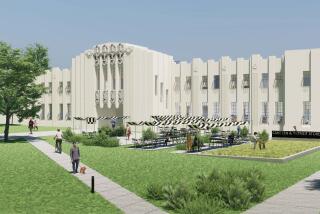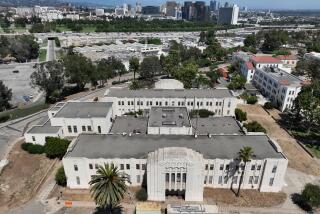Gardena Legion Post Losing Battle to Keep Its Quarters
- Share via
Huddled round a dimly lighted bar at the end of a long, dark hall, five veterans of World War II and the Korean War sipped their brews and watched noontime television on a set mounted above rows of empty glasses.
Here, at American Legion Post 187 in Gardena, veterans have gathered since 1927 to discuss everything from politics to family problems in the company of comrades.
This week, conversations turned toward the Persian Gulf crisis.
“I think we should obliterate Iraq and its people if they start shooting at us or go into (Saudi) Arabia,” ventured Floyd Brown, a World War II veteran who served on a Navy fuel tanker that supplied the Pacific Fleet.
But the American presence in Saudi Arabia wasn’t the only topic discussed among the group of mostly retired men. Brown and his buddies also spoke glumly about the “FOR SALE” sign that hangs outside the post on the corner of Gardena Boulevard and Normandie Avenue.
Declining membership and higher costs have prompted the Gardena post to put its property up for sale and look for a cheaper home elsewhere in the city.
“A lot of the old members are dying off, and younger people aren’t coming in,” said Wayne Cushman, the bar manager and a past commander of the post.
To demonstrate his point, Cushman pointed to the post’s yellowing 1920 charter, framed on the wall and draped in black cloth this week because of the recent death of “a fallen comrade.” This Saturday, post members will have a memorial for their friend, Pat Patrick, who served in the Navy during World War II and died last week.
Just 15 years ago the post had more than 700 members, said Cushman, 56, a Navy man in the Korean War. Now there are 275 members, he said.
The post’s youngest eligible members, Vietnam veterans, would be 37, Cushman said. The legion accepts any veteran who served in the armed forces during the two world wars, the Korean War or the Vietnam War.
The legion is trying to persuade Congress, which chartered the organization, to expand the ranks to include veterans who served during other periods of conflict, such as the Beirut incursion and the Grenada and Panama invasions.
The decline in membership at the Gardena post stems partly from the reluctance of Vietnam veterans to join, said Brown. Many were traumatized by combat and again by hostility they encountered when they returned home, Brown said. “But they’re as welcome as any other fighting man,” he quickly added.
Membership might be declining at the Gardena post, but nationally the American Legion is growing, said Lou Wood, national public affairs director for the group. Last year, legion membership surpassed the 3-million mark for the first time. However, not all these new members actually join a local post, he noted.
Similarly, the Veterans of Foreign Wars, the country’s other major veterans organization, has also been growing and now includes more than 2 million members. Veterans must have been overseas in combat to join the group.
About a dozen posts of both groups dot the South Bay area, some growing and some shrinking.
In recent years, VFW Post 2828 in Redondo Beach has been steadily adding to its membership, now at 403, said Franz Wedemann, who just stepped down as the post’s commander. Wedemann, a Vietnam veteran, said veterans from that war “are just coming out now to join. . . . Before, many just crawled into a hole and wanted to forget.”
But some posts, like Gardena’s, have seen many of their members move away. Inglewood’s American Legion Post 188 had a membership of 1,200 in the mid-’50s, said member Bill Kreitz. “We’re in an old neighborhood. People have left here,” he added. Newer residents haven’t joined the post, and membership is now about 400.
During the Gardena post’s heyday in the ‘70s, it had plenty of members and plenty of money. Fifteen years ago, the post purchased the lot next door and built a new hall. The original 1920s brick building is now mostly rented for receptions and other events.
During those times, the Horseshoe Club, a local card club, paid most of the post’s expenses, said Thomas Vincent, the post’s finance officer. Because of an arrangement worked out by the city to benefit the veterans, Gardena’s veterans posts owned card club licenses that were then franchised out to the card clubs for a monthly fee.
Monthly payments to the Gardena legion post, which fluctuated throughout the years, at one time exceeded $10,000, and the post was able to donate money to several public service organizations and run charitable programs of its own, Vincent said.
About five years ago, after some of the city’s card clubs had folded and the licenses diminished in value, the post sold its license to the Horseshoe Club, and the payments stopped.
Today, with less money and fewer members, the post is having a harder time paying tax, insurance and maintenance costs for its two buildings. Revenues come from liquor sales, rental fees and annual membership dues.
Crowds on a typical night vary widely, ranging anywhere from two or three fellows to a dozen, members said. A few times a month, special dinners or events will draw larger groups.
In a corner of the old hall, cobwebs grow on a 48-star Old Glory encased in glass, and dust settles on World War I recruitment posters that line the walls. In the new hall, upholstered chairs and elegant tables often sit in darkness in most of the room, where the lights are kept off to conserve electricity.
“It’s a matter of economics. We have to move,” Cushman said. Although the post could sell just one of the buildings, the property is worth more money if both lots are sold together, Cushman said. The asking price is $1.9 million, he added.
At the bar, some veterans had different opinions about the gulf crisis, but they spoke with one voice about the post. “It’s the nicest bar in town,” said Brown, a veteran not only of the Navy but of Gardena since 1949. “It’d be a shame to move.”
More to Read
Sign up for Essential California
The most important California stories and recommendations in your inbox every morning.
You may occasionally receive promotional content from the Los Angeles Times.









